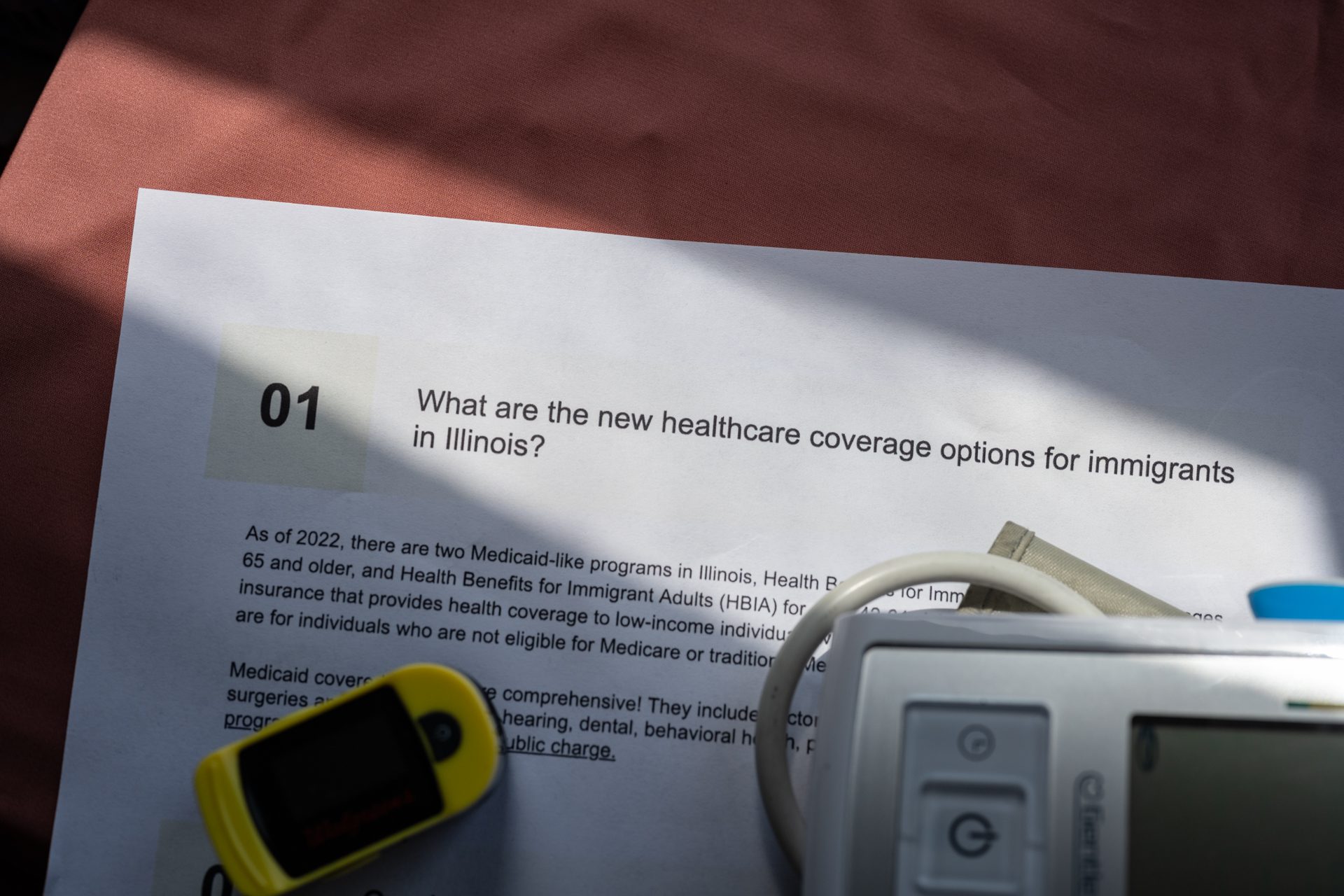 Photo illustration by Max Herman/Borderless Magazine
Photo illustration by Max Herman/Borderless Magazine Thousands of Illinois immigrants have lost health coverage, with the end of the Health Benefits for Immigrant Adults (HBIA) program July 1. Borderless Magazine compiled a guide to explain who’s affected and what options are available.
Gov. JB Pritzker’s state budget cut has left thousands of undocumented immigrants in Illinois without healthcare access. Now, they’re scrambling to find alternatives.
The Health Benefits for Immigrant Adults program, which provided coverage to undocumented immigrants ages 42 to 64, was cut after Gov. JB Pritzker unveiled his $55.2 billion state budget in March.
Pritzker said federal budget cuts were behind the decision to cut the program. HFS spent a total of $487 million in the 2024 fiscal year to administer the HBIA program. But the move sparked backlash from Democratic lawmakers and immigrant rights groups advocating for continued access to care.
News that puts power under the spotlight and communities at the center.
Sign up for our free newsletter and get updates twice a week.
This comes as undocumented immigrants face numerous challenges, including the Trump administration’s efforts to overturn birthright citizenship, nationwide Immigration and Customs Enforcement (ICE) raids and growing uncertainty about their rights.
“These are the people who pay taxes, care for our elders and helped carry this state through a pandemic,” said U.S. Rep. Jesús “Chuy” Garcia, D-III. “Cutting their access to care now would be not just cruel but counterproductive and costly.”
Borderless Magazine compiled a resource guide to explain who’s affected and what alternatives there are to health care, regardless of status.
Who will be affected?
The HBIA program provides healthcare to noncitizens ineligible for Medicaid between the ages of 42 and 64 who are:
- Undocumented immigrants, including individuals with Temporary Protected Status (TPS)
- Illinois residents
- Individuals with a 2022 household income at or below $18,754 for one person; at or below $25,268 combined income for a household of two.
Healthcare providers and hospitals that serve HBIA patients will also feel the strain due to the program’s end. They say the cancellation will impact the entirestate, as studies have shown that programs like HBIA are often cost-effective.
“One way or the other, either the hospital’s individual patients or insurers of a state are going to pay,” said Aresha Martinez-Cardoso, assistant professor of public health sciences at the University of Chicago.
What services will be impacted with the end of HBIA?
HBIA covered services like:
- Primary care visits
- Care at a Federally Qualified Health Center (FQHC)
- Vaccinations
- Prescription medications
- Dental and vision services
Note: This is not a complete list of services.
Read More of Our Coverage
How do I know if I lost coverage?
HBIA enrollees should have received a mailed letter by April 1. The letter notifies them that their health coverage would have ended on June 30. A final termination notice was also mailed on June 15, preceding the program’s official termination on July 1.
Is coverage for seniors ending too?
The Health Benefits for Immigrant Seniors (HBIS), which provides healthcare to those 65 and older without legal status, remains active.
However, the program has temporarily paused for new applicants.
What are my options?
Here are free or low-cost options for those losing HBIA coverage:
Cook County Health CareLink
HBIA enrollees may be eligible to apply for the CareLink program until June 30, 2026. Individuals can get a discount on care based on income level — for example, $39,125 for a household of one. The program covers medical visits, labs, hospital stays and prescriptions.
- No documentation of SSN is required for those who were enrolled through HBIA.
- A $4 copay is required for most prescriptions.
Charity Care / Hospital Financial Assistance
All Illinois hospitals must provide free or low-cost care to uninsured, low-income residents — regardless of status. Individuals can verify their eligibility for this medical financial assistance program based on their annual income, total debt and household size on this site.
ACA Marketplace Coverage (for lawfully present immigrants)
Individuals with Temporary Protected Status, active parole or have an active work permit can qualify for ACA marketplace coverage.
Family Planning Program (FPPE)
Anyone eligible for HBIA also meets eligibility requirements for the FPPE, which offers temporary coverage for reproductive health services. To qualify, individuals must:
- be an Illinois resident with income of up to $3,754 per month;
- not be currently pregnant;
- and not enrolled in Medicaid or a similar program.
Access DuPage / Access to Care
Access DuPage serves residents of DuPage who are not eligible for health insurance.
In order to qualify, applicants must be:
- a permanent DuPage County resident;
- be 19 or older;
- and have an income at or below 250% of the federal poverty level.
Access DuPage offers low-cost health care services, including primary care, medications and specialty care services.
Illinois Association of Free & Charitable Clinics
IAFCC offers directories on local free and charitable clinics across the state for those who cannot pay for medical services.
NeedyMeds is a national nonprofit that helps patients find affordable medications. It offers a directory to help them find affordable health clinics, diagnosis-based assistance and patient assistance programs that provide free or low-cost medicines.
Rx Outreach offers programs related to providing affordable medicine to individuals regardless of income level or immigration status. It partners with community organizations to reduce financial and social barriers to help by providing resources for affordable medical care.
Where can I find more information?
- ICIRR Health Hotline: 855-435-7693
- HelpHub Support for providers: helphub.org
- Cook County Financial Counselors: Available at select Cook County Health clinics. Visit the CareLink website for details.
What’s next?
As of now, there are no plans to reopen the HBIA program. According to the Illinois Department of Healthcare and Family Services, future enrollment depends on whether the state’s budget allows for it. But officials say they “cannot predict when or if that would happen.”
Lucy Baptiste is a Borderless reporting intern. She can be reached at [email protected].
Tara Mobasher is a Northwestern Medill Reporting fellow at Borderless Magazine. Email Tara at [email protected].
Clarification 7/24/25: This story has been updated to clarify how HBIA enrollees could be eligible to apply for the CareLink program under Cook County Health.


